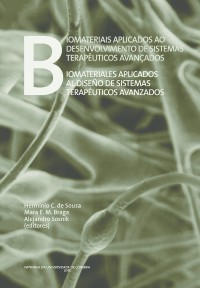Please use this identifier to cite or link to this item:
https://hdl.handle.net/10316.2/36868| DC Field | Value | Language |
|---|---|---|
| dc.contributor.author | Caracciolo, Pablo C. | |
| dc.contributor.author | Abraham, Gustavo A. | |
| dc.date.accessioned | 2015-07-07T15:00:28Z | |
| dc.date.accessioned | 2020-09-09T09:35:22Z | - |
| dc.date.available | 2015-07-07T15:00:28Z | |
| dc.date.available | 2020-09-09T09:35:22Z | - |
| dc.date.issued | 2015 | - |
| dc.identifier.isbn | 978-989-26-0880-8 | |
| dc.identifier.isbn | 978-989-26-0881-5 (PDF) | |
| dc.identifier.uri | https://hdl.handle.net/10316.2/36868 | - |
| dc.description.abstract | Segmented polyurethanes (SPU) are block copolymers widely used as biomaterials due to their good biocompatibility and chemical and structural versatility, characteristics that allow a broad range of properties. In the biomedical field, SPU elastomers are mainly used in biostable implants and several biomedical devices. However, polyurethanes are susceptible to hydrolytic and oxidative degradation in physiological conditions, allowing the development of temporary constructs for regenerative medicine. In this chapter, the main aspects showing the complexity and versatility of biomedical polyurethanes respect to their synthesis, physicochemical and surface properties, processing and applications are presented. Nowadays, some applications provide the medical community with commercial devices that have evolved over half a century accompanying the advance of science and technology of biomaterials and modern characterization techniques. However, there is still a long way to go to meet the requirements of tissue engineering and regenerative medicine, where the development of non-toxic biodegradable polyurethanes with suitable properties for tissue and organ regeneration is required. The constant appearance of new formulations and diverse processing techniques show that polyurethanes have an interesting future in order to pursue success in the various specific applications that will emerge. | eng |
| dc.description.abstract | Los poliuretanos segmentados son copolímeros en bloque que se emplean ampliamente como biomateriales debido a su buena biocompatibilidad y a la versatilidad química y estructural, características que posibilitan una enorme variedad de propiedades. En el campo biomédico, se aplican principalmente como elastómeros en implantes bioestables y diversos dispositivos biomédicos. Sin embargo, ciertos poliuretanos son susceptibles a degradación hidrolítica y oxidativa en condiciones fisiológicas, propiedad que permite el desarrollo de aplicaciones temporales en medicina regenerativa. En este capítulo se presentan los principales aspectos que muestran la complejidad y al mismo tiempo la versatilidad de los poliuretanos biomédicos con respecto a su síntesis, propiedades fisicoquímicas y superficiales, procesamiento y aplicaciones. Algunas aplicaciones proporcionan a la comunidad médica dispositivos comerciales que han evolucionado a lo largo de medio siglo acompañando el avance de la ciencia y tecnología de biomateriales y las técnicas modernas de caracterización. Sin embargo, aún existe un extenso camino por recorrer para satisfacer los requerimientos de la ingeniería de tejidos y la medicina regenerativa, donde se requiere el desarrollo de poliuretanos degradables no tóxicos con propiedades adecuadas para regenerar tejidos y órganos. La constante aparición de nuevas formulaciones y diversas técnicas de procesamiento demuestran que los poliuretanos poseen un futuro interesante en aras de perseguir el éxito en las diversas aplicaciones específicas que irán surgiendo. | por |
| dc.language.iso | spa | - |
| dc.publisher | Imprensa da Universidade de Coimbra | por |
| dc.relation.ispartof | http://hdl.handle.net/10316.2/36860 | por |
| dc.rights | open access | - |
| dc.subject | Segmented polyurethanes | eng |
| dc.subject | Elastomers | eng |
| dc.subject | Structure-property | eng |
| dc.subject | Relationships | eng |
| dc.subject | Biomedical applications | eng |
| dc.subject | Poliuretanos segmentados | por |
| dc.subject | Elastómeros | por |
| dc.subject | Relación propiedades-estructura | por |
| dc.subject | Aplicaciones biomédicas | por |
| dc.title | Poliuretanos biomédicos: síntesis, propiedades, procesamiento y aplicaciones. | por |
| dc.title.alternative | Biomedical polyurethanes: synthesis, properties, processing and applications. | eng |
| dc.type | bookPart | por |
| uc.publication.firstPage | 148 | - |
| uc.publication.lastPage | 181 | - |
| uc.publication.location | Coimbra | por |
| dc.identifier.doi | 10.14195/978-989-26-0881-5_4 | - |
| uc.publication.digCollection | PB | por |
| uc.publication.orderno | 5 | - |
| uc.publication.area | Ciências da Saúde | por |
| uc.publication.bookTitle | Biomateriais aplicados ao desenvolvimento de sistemas terapêuticos avançados | - |
| uc.publication.manifest | https://dl.uc.pt/json/iiif/10316.2/36868/208426/manifest?manifest=/json/iiif/10316.2/36868/208426/manifest | - |
| uc.publication.thumbnail | https://dl.uc.pt/retrieve/11137842 | - |
| uc.publication.parentItemId | 54553 | - |
| uc.itemId | 69719 | - |
| item.grantfulltext | open | - |
| item.fulltext | With Fulltext | - |
| Appears in Collections: | Biomateriais aplicados ao desenvolvimento de sistemas terapêuticos avançados | |
Files in This Item:
| File | Description | Size | Format | |
|---|---|---|---|---|
| cap_tulo_4_-_poliuretanos_biom_dicos_s_ntesis__propiedades__procesamiento_y_aplicaciones.pdf | 2.3 MB | Adobe PDF |  |
Items in DSpace are protected by copyright, with all rights reserved, unless otherwise indicated.
